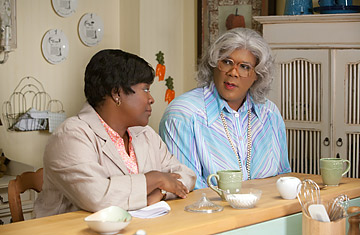
From Left: Shirley (Loretta Devine) and Madea (Tyler Perry) in Tyler Perry's Madea's Big Happy Family.
(2 of 2)
Madea's niece Shirley (Loretta Devine) is dying of cancer, and she has invited her grown children home to tell them that she has only a few weeks to live; but her offspring are so encased in their own domestic miseries that they pay her no heed and storm out before she can break the bad news. Kimberly (Shannon Kane), a snooty Buppie, is derisive of her pious mom and hostile to her handsome, gentle husband Calvin (Isaiah Mustafa) and their infant child. Tammy (Natalie Desselle Reid) throws her decent husband Harold (Rodney Perry) out of their bedroom on their wedding anniversary, shouting, "Keep your stuff in your pants. Good night." The youngest, Byron (Shad "Bow Wow" Moss), is just out of prison on a drug-dealing rap; both his girl friend Renee (Lauren London) and his ex, Sabrina (Tevana Taylor), want him to get back in the drug business so they can live the high life. It's a mess needing Mama Fixit, Madea.
You don't need a scorecard to keep track of the film's dozen or more major characters, because you'll soon realize that all the women under 50 are harpies, scourges and would-be castrators. They're not nice to a cancer-depleted sweetheart, either. When Shirley takes a bus and then walks miles to Kimberly's suburban home to get money for Byron's bail, her daughter is ready to toss her back into the night; only Calvin offers his sympathy and help. Near tears, Shirley says, "I don't know why she treats me this way." Because she's one of the many mandatory megabitches in the Tyler Perry oeuvre. Perry will eventually provide an explanation for Kimberly's ill temper, allowing for climactic remorse and salvation. That's how the author tries to turn cliché into catharsis.
But he means Big Happy Family to be as fun as it is uplifting. For the females in the audience who might take offense at the way womanhood is portrayed, Perry peoples his casts with great-looking guys. Often the men remove their shirts, displaying the rippling physique of the Old Spice dude. (Since Mustafa, who plays that role in the after-shave commercials, is in the film, it's odd that he remains fully clothed.) Even the doctor who diagnoses Shirley's cancer is a hunk (Philip Anthony-Rodriguez, who looks like a dreamier version of Newark Mayor Cory Booker). In movies, beauty imposes its own morality; in Perry movies, the male characters are purer than the females, and the men are more gorgeous.
There's also a strange fondness for gay humor. When the sassy, weed-smoking Aunt Bam (Cassi Davis) accompanies Shirley to the hospital and catches sight of Dr. Dishy, she says, "Are you straight? You gotta ask that question these days." Then she presses her backside against his crotch, smiles and says, "He's straight." Later, when Calvin and Harold complain about their domineering wives, Byron observes, "You both sound like y'all in prison." Replies Harold, "I'd get more love in prison." Then consider that the one woman who knows how to take charge without alienating the men is played by the 6-ft.-5-in. Perry in a dress, with Medea's fake breasts swaying inside like half-filled sandbags. It's a gender-bending menagerie.
The wildest animal, as well as the lion tamer, is Madea, making her sixth appearance in a Perry film. She walks stiffly, as if she'd given herself a wedgie, and sports an accent that is usually rural-Southern, unless she's pronouncing a word like "Hallelujer," as if she's channeling Ole and Lena, the Minnesota Swedes on A Prairie Home Companion. In Big Happy Family she's first seen driving her dilapidated Caddy up to a fast-food joint. When she gets only lip, but no morning muffin, from the voice on the speaker system (it's Byron's ex, Sabrina), she crashes her car through the front doors and into the counter, giving a new meaning to drive-through restaurant.
Grouchy and not overtly religious, Madea is as proud of her limitations as she is ruthless about others'. When one of the guys notices her stretch marks, she calls them "a road map to Heaven. They're a GPS to a place you've never been." By now, Perry has either perfected the role or exhausted it, depending on your threshold of tolerance. But her function remains the same as in previous Perrys: to bring comic relief to the first half of the film and, in the second, to impose order on the domestic chaos. She cues the audience when to laugh at the many caricatures of any battling family and when to get serious, have good cry and attend to Perry's moral lessons. Here, these involve getting the women to make an apology and the men to accept it.
If Perry gets on your wavelength, you can forgive him too. He's only the host at a home-cooked banquet of wild emotions. And when the story is over, and the obligatory comic outtakes have run over the closing credits end, the master of ceremonies appears one last time, as Madea, to say, "Thank you for comin' to this movie." See? The angry old woman is really a gentleman.
